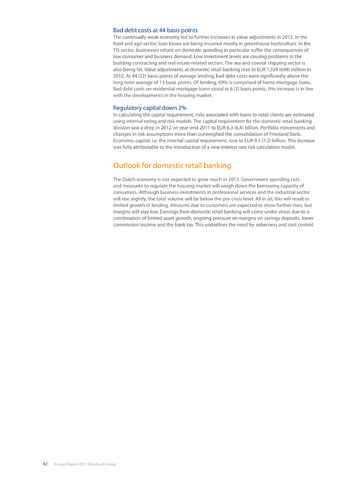Bad debt costs at 44 basis points
Regulatory capital down 2%
Outlook for domestic retail banking
The continually weak economy led to further increases in value adjustments in 2012. In the
food and agri sector, loan losses are being incurred mostly in greenhouse horticulture. In the
TIS sector, businesses reliant on domestic spending in particular suffer the consequences of
low consumer and business demand. Low investment levels are causing problems in the
building contracting and real estate-related sectors. The sea and coastal shipping sector is
also being hit. Value adjustments at domestic retail banking rose to EUR 1,329 (648) million in
2012. At 44 (22) basis points of average lending, bad debt costs were significantly above the
long-term average of 13 basis points. Of lending, 69% is comprised of home mortgage loans.
Bad debt costs on residential mortgage loans stood at 6 (3) basis points, this increase is in line
with the developments in the housing market.
In calculating the capital requirement, risks associated with loans to retail clients are estimated
using internal rating and risk models. The capital requirement for the domestic retail banking
division saw a drop in 2012 on year-end 2011 to EUR 6.3 (6.4) billion. Portfolio movements and
changes in risk assumptions more than outweighed the consolidation of Friesland Bank.
Economic capital, i.e. the internal capital requirement, rose to EUR 9.1 (7.2) billion. This increase
was fully attributable to the introduction of a new interest rate risk calculation model.
The Dutch economy is not expected to grow much in 2013. Government spending cuts
and measures to regulate the housing market will weigh down the borrowing capacity of
consumers. Although business investments in professional services and the industrial sector
will rise slightly, the total volume will be below the pre-crisis level. All in all, this will result in
limited growth in lending. Amounts due to customers are expected to show further rises, but
margins will stay low. Earnings from domestic retail banking will come under stress due to a
combination of limited asset growth, ongoing pressure on margins on savings deposits, lower
commission income and the bank tax. This underlines the need for soberness and cost control.
42 Annual Report 2012 Rabobank Group

